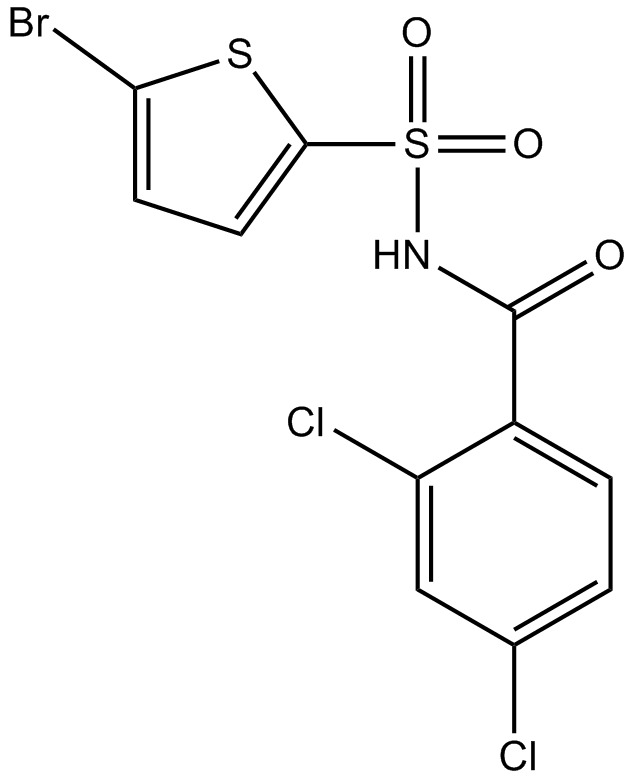Tasisulam (Synonyms: LY573636) |
| Catalog No.GC10294 |
Le tasisulam est un agent anticancéreux et induit l'apoptose via la voie intrinsèque, entraÎnant la libération de cytochrome c et la mort cellulaire dépendante de la caspase. Le tasisulam inhibe la progression mitotique et induit la normalisation vasculaire.
Products are for research use only. Not for human use. We do not sell to patients.

Cas No.: 519055-62-0
Sample solution is provided at 25 µL, 10mM.
Tasisulam is an antitumor agent [1].
Tasisulam is an antitumor agent that induced growth arrest and apoptosis of human solid tumours. In human malignant hematopoietic cell lines, tasisulam inhibited cells growth with ED50 values of 5, 7, 12, 13, 21 and 31 μM for BALL1, HL60, RCH, NCEB1, SP49 and Daudi cell lines, respectively. Tasisulam induced growth arrest in a dose-dependent way. Also, tasisulam caused induction of ROS, loss of mitochondrial membrane potential and induction of apoptosis. In HL60 and U937 cells, tasisulam induce granulocytic/monocytic differentiation. In solid tumor cell lines, tasisulam induced apoptosis that was mediated by the mitochondrial-mediated cell death pathways [1]. Tasisulam increased phospho-histone H3 expression and cells with 4N DNA, and led to G2-M accumulation and apoptosis. Tasisulam also inhibited endothelial cell cord formation induced by epidermal growth factor, VEGF and fibroblast growth factor with EC50 values of 34, 47 and 103 nM, respectively.
In mice bearing the Calu-6 non-small cell lung xenograft model, tasisulam exhibited antitumor efficacy in a dose-dependent way and reduced tumor volume by 77%. Tasisulam caused G2-M accumulation and increased nuclear fragmentation. Also, tasisulam induced vascular normalization [2].
References:
[1]. Haritunians T, Gueller S, O'Kelly J, et al. Novel acyl sulfonamide LY573636-sodium: effect on hematopoietic malignant cells. Oncol Rep, 2008, 20(5): 1237-1242.
[2]. Meier T, Uhlik M, Chintharlapalli S, et al. Tasisulam sodium, an antitumor agent that inhibits mitotic progression and induces vascular normalization. Mol Cancer Ther, 2011, 10(11): 2168-2178.
Average Rating: 5 (Based on Reviews and 16 reference(s) in Google Scholar.)
GLPBIO products are for RESEARCH USE ONLY. Please make sure your review or question is research based.
Required fields are marked with *




















